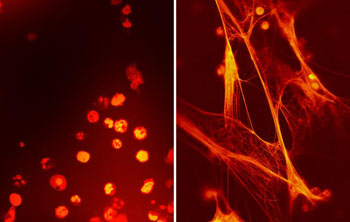Peptide from Umbilical Cord Blood Shuts Down a Neutrophil Inflammatory Factor
By LabMedica International staff writers
Posted on 19 Sep 2016
Researchers have isolated a peptide in umbilical cord blood that blocks the formation of neutrophil extracellular traps (NETs) and reduces inflammation and risk of developing sepsis.Posted on 19 Sep 2016
NETs are molecular lattices of decondensed chromatin embedded with histones, granule enzymes, and antimicrobial peptides that are extruded by immune system neutrophil granulocytes, (polymorphonuclear leukocytes or PMNs) to capture and contain bacteria, viruses, and other pathogens. Experimental evidence has indicated that NETs also cause inflammatory vascular and tissue damage, suggesting that identifying pathways that inhibit NET formation may have therapeutic implications.

Image: Infection fighting cells from umbilical cord blood (left) and circulating blood three days after birth (right) from the same prematurely born baby. Umbilical cord blood has high levels of neonatal NET inhibitory factor (nNIF), which inhibits formation of neutrophil extracellular traps (NETs) (Photo courtesy of Mark Cody/Diana Lim, University of Utah Health Care).
After examining various potential sites for the presence of a NET inhibitor, investigators at University of Utah Health Care (Salt Lake City, USA) discovered a peptide in umbilical cord blood that inhibited NET formation in vitro and in vivo and that appeared to be an endogenous regulator of NET generation.
They reported in the September 6, 2016, online edition of The Journal of Clinical Investigation that in addition to this neonatal NET-inhibitory factor (nNIF), they had also identified additional nNIF-related peptides (NRPs) that inhibited NET formation. These nNIFs and NRPs blocked NET formation induced by pathogens, microbial toxins, and pharmacologic agonists in vitro and in mouse models of infection and systemic inflammation, and they improved mortality in mouse models of systemic inflammation.
"We found something we were not expecting, and it has taken us to new strategies for therapy that did not exist before," said senior author Dr. Guy Zimmerman, professor of internal medicine at University of Utah Health Care.
Related Links:
University of Utah Health Care














